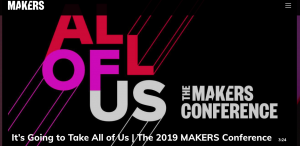
Due to a scheduling conflict, and much much to her chagrin, I got to take Gina’s place at the Maker’s conference this year and it was a revelation. Beyond the moving stories and empowering interviews, the networking with amazing women, and even the concert with John Legend, what has stayed with me was the opening presentation on the first full day- Makers on the Front Line: Talent Rising. This update on the status of women in the workplace by McKinsey legend Joanna Barsh laid out the systemic issues confronting women and businesses and what to do about it. The problem really comes down to this– there is no solution, there is no quick fix and nobody has the answers. That sounds super depressing and the solutions presented seemed vague and difficult to enact. But, instead of seeing this as a negative, I prefer to make it into a positive ie: companies have to learn how to be agile, to try out new policies and admit when they don’t work. I am sure HR and executive leadership wish there was a magic solution but gender inequity is a deeply entrenched problem and companies need to remain focused, bring in outside resources (like The Second Shift) and be transparent about their goals and their failures Below is a summarized list of the findings from McKinsey and Makers.
1. Leaders must vocally make diversity and inclusion the top priority for cultural change.
2. Leaders must: set improvement goals, use incentive compensation to reinforce accountability, adopt radical transparency, enlist peer pressure to keep their teams to focus on their goals, use positive reinforcement and call out bad behavior, share progress publicly.
3. Diversity top leadership with critical mass: aim to fill 33 % of top seats with diverse talent. restructure leadership roles and top teams, give diverse talent first shot at open seats.
4. Mobile thought leaders: spotlight influencers who exhibit the type of behavior and mindset you want from employees. Offer training and coaching for mid-level talent, integrate diversity and inclusion at every level.
5. Re-imagine talent management: mandate 50% diverse slates of candidates for every job. Provide mentorship and coaching to shepherd talent through their careers and advocate on their behalf. Challenge bias in hiring and promotions. De-bias performance management.
6. Make the work-place “sticky” for women: staff teams with more than one woman to combat the “only” syndrome. Provide benefits that remove work-life friction. Bend or break rules to address a temporary employee challenge. Destigmatize nontraditional paths and careers.
7. Shore up resilience: stay focused on goals and be open with your challenges, successes, and failures. Take a test, learn, adapt approach. Change hr and diversity leaders when a refresh is needed.
Look, we all know there is an issue and it seems like there is a real desire to fix things but when a problem is so large it can seem overwhelming. We tell companies that we work with that working with The Second Shift is a small step toward a larger goal. Maternity fill-ins, part-time work, flexible full-time job opportunities– these are all micro steps but they have the ability to change culture and preconceived notions and biases. Enough small steps can make big leaps happen!